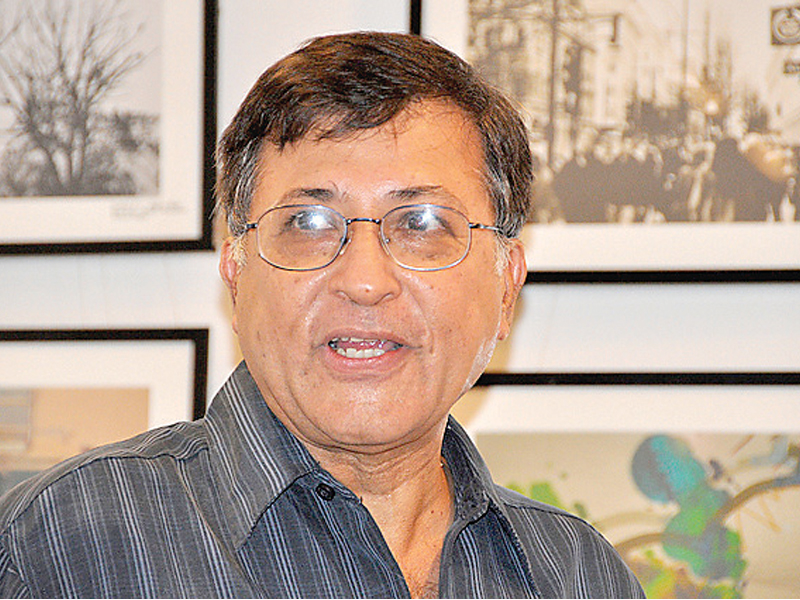
The development of science cannot be attributed to one person or a part of the world - it is the collective effort of multiple civilizations over thousands of years, said Hoodbhoy. Similarly, the Islamic civilization did not only utilise the great corpus of knowledge that the Greeks passed on to the European civilisation, but also made its mark through invaluable contributions.
There is not a shadow of doubt about the enormous contributions made by Muslim scientists between the ninth and 13th centuries, he added. “There was a time when the role of Muslims in the filed of science was not recognised in the West and there were only a few names which gained recognition even till the beginning of the twentieth century, such as Belgian chemist and historian George Sarton,” said Hoodbhoy, adding that Sarton, who developed the history of science as an academic discipline, authored five volumes on the subject and dedicated the first one and a half to seminal contributions of Muslim scientists.
Golden days
Mentioning the names of physicist Ibn al-Haytham, alchemist Jabir Ibn Hayyan, physician Ibn Sina (Avicenna), Hoodbhoy said “There were achievements after achievements [in that era] and we have every right to be proud of them.”
He also spoke the philosopher and theologian Ibn Rushd (Averroes), whose name has been carved on the Massachusetts Institute of Technology (MIT) building along with names of other famed scientists Isaac Newton, René Descartes and Gottfried Wilhelm von Leibniz. “Averroes was the one who brought scientific rationality into such sharp focus that he became, in a sense, the intellectual father of Renaissance,” said Hoodbhoy.

When Gundeshapur, the intellectual centre of the Sassanid Empire in Persia, fell to Muslim armies in the seventh century, they discovered the treasure of Greek learning in the form of manuscripts. “There was a curiosity during those times which lead to the introduction of science in Islam for the first time.”
Driven by this curiosity, Muslim scientists worked together to produce intellectual breakthroughs, said Hoodbhoy, which ultimately gave rise to brilliant personalities and publications that became the pride of Muslim civilisations centuries later and are present in our school textbooks.
The era of brilliance, however, slowly started to wilt and Hoodbhoy recalled only one name which made a lasting impact at the beginning of the 14th century, eminent historian Ibn Khaldun.
The downfall
When asked what Muslims have been doing for the past 900 years, Hoodbhoy replied “nothing”. “With the death of curiosity, the Muslim civilisation fell from the peaks of greatness.”
He lamented that more than a billion Muslims had nothing substantial to add to the world of science and technology and have ended up as mere consumers.
He urged Muslims to move away from the mindset which dictates that there is some fundamental contradiction between Islam and science or that advancement in the field is dependent on the availability of resources. “It does not matter how many universities you build, how much fancy equipment you import, how many research journal papers you publish,” he said.
“What matters are attitudes - the attitude of asking how and why and the scientific method of thinking critically. This is what we don’t teach our children and they fail to reach the first level of truth all their lives.”
Published in The Express Tribune, January 17th, 2013.
COMMENTS (10)
Comments are moderated and generally will be posted if they are on-topic and not abusive.
For more information, please see our Comments FAQ

1725783822-0/Tribune-Pic-(15)1725783822-0-165x106.webp)















@John B:
I smirked at your naive comment, ha persian scientist not muslim scientist?. Are you saying scientists such as Ibne Sina, Biruni, Birjandi etc were not more "muslim" rather "persian". I have read a lot about these scientists and believe me they were practising muslims, sometimes the pill is hard to swallow isn't it. And what about the other half of scientists?, yes the arabs, are you going to say they to where more "arab" or "pagans" then muslims?.
I'm a budding scientist myself John doing research in micro and nano electronics and am doing quiet well to be honest. I don't know why people like you brand us scientists into groups when really its our own effort and curiosity which helps us to become what we are today. Scientists come from everywhere, of every religion and of every colour. Science was always meant to serve the universal goal of humanity, unfortunately some people have put us into teams and started branding us. Its a collaborative effort John, it has always been!!!!
@John B: Persian is a race not a religion. But thank you for playing.
This guy is one of the top brain of Pak. And He is only man How wrote comprehensive book on Muslim Science.
Muslim scientists . The word is an oxymoron!
Still living in the past, it's time to come down to future
The Muslims straitjacketed themselves too much into religion. Right now, if anybody asks a question, it has to be within the framework of what the religion prescribes. Revolutionary ideas can never flower under such constraints.
science grows when children are allowed to think freely and allow them to question without the fear of dogma over them...Middle age Muslim societies allowed it which enabled them to prosper,while Christian society were persecuting the scientists..
However,it has been reversed now...the Christian countries have progressed and muslim countries have regressed with dogma....
P.S.Those who claim that Quran alone is enough for science,please give me few examples alongwith the verses..That embryology stuff quoted by Zakir Naik was actually discovered by Greeks centuries ago
I have some disagreements with the political views of Dr. Hoodbhoy, but have to agree he is gem of an intellectual. We need more people like him.
All good except for the word Muslim scientists. They are Persian scientists who retained their cultural base despite being under the influence of Islam. As Islamic theology began to dominate, science declined.
The Greek influence of science is an amalgam of Persian, Chinese, and Indian science and philosophy and the historical continuance in the islamic Persian world which existed even before the arrival of Islam.
One can see the intellectual shrinking through Persian literature of the subsequent era. Decline of cultural art and literature and dominance of religious ideology with decline in science. Then emerges European civilization of science and today it is American civilization of science.